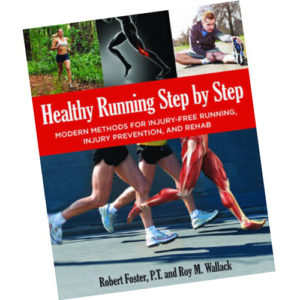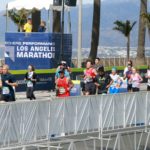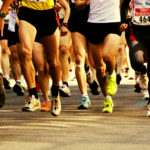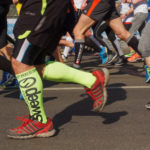By Robert Forster, PT, CEO
If you’re gearing up for the LA Marathon on March 8, you’re probably somewhere around the 20-mile mark in your training by now.
This is the ideal time to perfect your nutrition and hydration strategies to ensure you run your best race without bonking. If you haven’t read our previous article on carbo-loading, make sure you check it out here.
Also, don’t forget to come visit out sister company, Forster Physical Therapy at 427 Wilshire Blvd in Santa Monica for their annual Post-Marathon Recovery Event after the LA Marathon, which will include free injury evaluations, foam rolling, massages, recovery meals, hydration, ice bath, and more!
When planning your nutrition and hydration for the 24 hours prior to and during race day, it’s important to not do anything new that your body isn’t used to. This may cause cramping, digestive distress and other uncomfortable symptoms that will impede your run.
It’s best to start training your body to take in the proper nutrition and hydration to support your energy and performance right now so you’re in peak shape for March 18th! Below is a hydration plan you should begin implementing right now during your long runs and on race day.
Before Exercise/Race Day
Most runners are familiar with the effects of dehydration and the impact it can have on performance. Athletes on average sweat 1-2 quarts every hour, with some losing even more. Proper hydration and training your body to store adequate amounts of water is essential to supporting your long runs, especially on race day.
Hyper-hydration, a state in which you body can store larger than normal quantities of water, can’t be achieved overnight. You have to train your body to do this over time. It’s important to note that hyper-hydration is only effective with electrolyte drinks because your body needs to replenish lost sodium in order to avoid hyponatremia – a condition in which sodium levels in the blood get too low leading to high water levels in the body and causing cells to swell.
The night before long slow distance training sessions or race day, consume 16 oz of fluid before bed.
When you wake up, start the day with 16-24 oz. of caffeine-free fluid as these types of beverages count as half their actual volume. Instead choose sports drinks with electrolytes.
While waiting for your run or race to begin, drink 8-10oz of fluid per hour. Try to start with a fluid-swollen stomach, as the fluid will leave your stomach and enter your bloodstream faster when your stomach is stretched. It is VERY important to not try this for your first time on race day. You need to train your body to feel comfortable with this type of hydrating prior to then so start experimenting with this now to see how you feel.
If you will be running in hot water, make sure to salt your food liberally for the 2 days prior to your run. Check out our last article on carbo-loading to learn what you should and should not be eating the night before a long run or race day.
During Exercise/Run
The aim of the game here is to stay ahead and never allow food and water levels to run too low.
Consume 4-8 oz. of fluids (water or sports drinks) every 15 minutes in big gulps. Sports drinks must provide 30-60 grams of carbohydrates per hour (20 oz. bottle) in a 6-10% carbohydrate concentration. They should also provide 100-400mg of sodium, chloride potassium and magnesium each per 20 oz. bottle. GQ-6 3:2:1 Base Hydration is the brand that PHASE IV EP’s and trainers recommend the most.
After Exercise/Post-Race
Your work isn’t done once you cross the finish line or finish a long training run. What you do in the 30-60 minutes right after can make all the difference in your race day performance and post-run energy.
After exercise, you want to take in 24 oz. or fluids for every pound of weight lost. Begin by replenishing immediately by taking in a 4:1 ratio of carbohydrates to protein within 30 minutes of stopping exercise. Focus your carbs on easily absorbable high glycemic/sugary foods and add in some protein to keep insulin levels high to facilitate recovery. Examples of this would be chocolate milk, bananas and an ounce of nuts, bagels and peanut butter or this Vega Sport® Recovery Drink.
In the following 4 hours after you run, move from high glycemic foods (simple sugars) to low glycemic foods (complex carbohydrates) as beans/lentils, whole grains, leafy greens, vegetables and certain fruits.
Maintain a protein intake fo 0.5-0.9 grams per pound of body weight per day, especially during periods of high-intensity workouts and heavy weight work. This would be about 75-135g protein for a 150 lb. person. Take in 3-5 grams of carbohydrates per kilogram of body weight per day on the day before big efforts and day of hard efforts (maybe less on days between hard efforts). This would be about 204-340 grams of carbohydrates for a 150 lb. person. Always consume carbohydrates from natural, unrefined sources such as whole grains, fruits and vegetables.
Additional Resources
If you’re interested in getting personalized nutrition and training support for your upcoming races, contact PHASE IV to schedule a complimentary 30-minute complementary consultation where we will share our tried and tested scientific approach for your best race ever! Call us at 310-582-8212 to schedule your consultation today!
Also, don’t forget to get your copy of PHASE IV CEO Robert Forster P.T.’s book, Healthy Running Step by Step. It’s the ultimate guide every runner needs to run faster and stronger without getting injured or hitting a wall!









